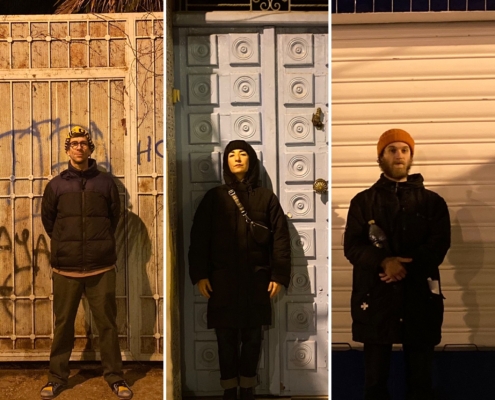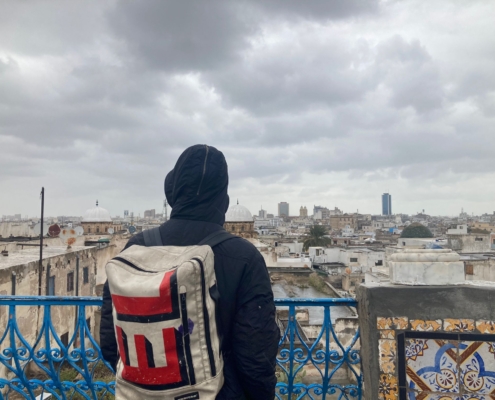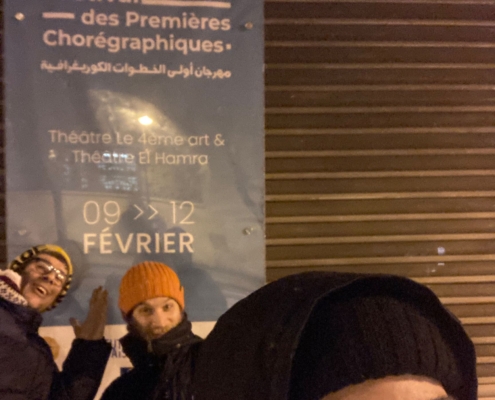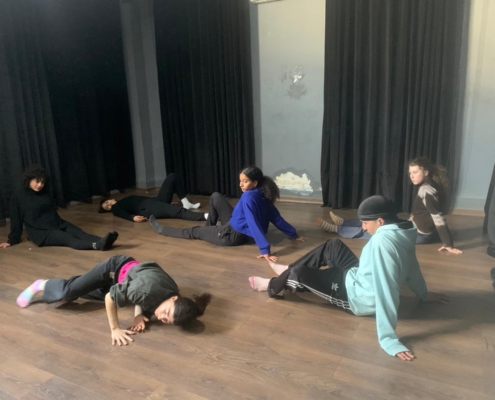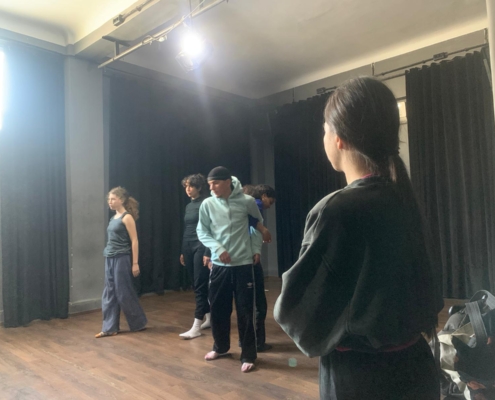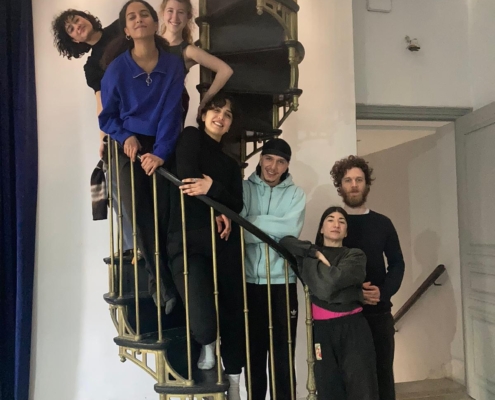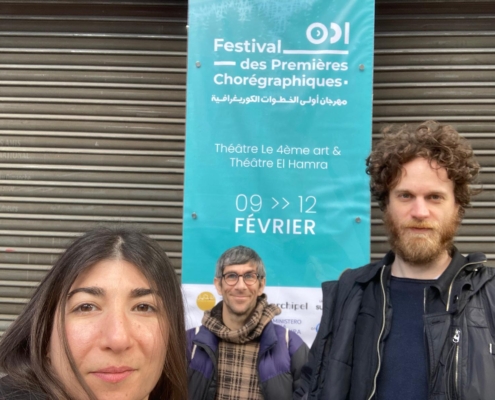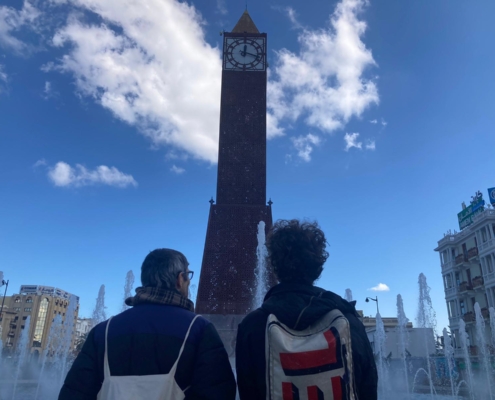CollettivO CineticO in Tunis
I am Angelo Pedroni. One of the hearts of CollettivO CIneticO.
The Tunisian mission team was composed of:
Me.
Teodora Grano, multifaceted perfomer/artist and, fortunately for us, half polyglot.
Andrea Amaducci, performer and visual artist. One of the first pillars of the company.
We had no expectations from Tunisia, in the sense that we were literally ready for anything. Just the taste of the unknown, the certainty of an encounter with something sufficiently distant, the pleasure of our work and the hope of encountering some passion in the form of human beings.
We travelled on a Thursday morning (meaning 6 a.m.). The arrangements were perfect.
We arrived tired, but ready. On arrival, Mey, our local field representative, escorted me to the hotel and provided information for everyone. My companions went by another vehicle (one that took less time to arrive). Mey was to become my primary source of information over the next few days. Mey also spoke English.
For the most part, the international language spoken is French. As the theatre technicians later explained to me, the population of Tunis is divided into 2 major language generations.
Everyone is bilingual Arabic/French. In addition, the young people also speak English, the older ones a little Italian (thank you Rai1, in general they learnt from Italian television which was the only one available when they were children).
The festival that hosted us was the Festival des Premiéres Chorégraphiqes in Tunis. Our hotel was about 30 minutes away from both main performance venues. We received accreditation for all performances and already on the first day we were able to get in touch with the host artistic reality.
Our actual ability to find our way around the city was poor (despite directions and maps), but we allowed ourselves to be carried away by our desires without any uncomfortable feelings of danger.
The Tunis experience was mainly auditory and olfactory. A kind of super Mediterranean enhanced. The absence of religious images, the generalised chaos that becomes a smokescreen of detail, the shouted multilingualism, the calls of the muezzins and the resulting paralysis of the religious. It was a city where it was difficult to walk around without being dragged (with the possibility of literally being dragged inside the Medina by perfume sellers).
Our programme was:
Thursday 9 February – arrival in the morning and sightseeing of the festival spaces and performances
Friday 10 – pre-assembly and festival performance viewing
Saturday 11 – evening performance and festival performance viewing
Sunday 12 – morning workshop with a group of Tunisian dancers and festival performance viewing
Monday 13 – morning departure
We presented a show from the company’s early days. A survivor, in repertoire non-stop since 2009. A work of those that you necessarily trust and can enter into immediate dialogue with.
O+<
Vicious Writings on the Unstoppability of Time
At the time, the Collective was only producing unpronounceable graphic titles (see “XD” “::D” “I x I” etc.). The work consists of a dialogue between aə dancerə (in this case Teodora) and Andrea.
The action takes place on a 2×6 m white surface. Teodora moves around it while Andrea quickly opens and closes her eyes, picks up an image frame and immediately translates it on the panel with an indelible marker. In this way a pattern is created on the white that slowly becomes graphic noise while this dialogic feedback relationship continues between the two.
It is a piece designed specifically for off spaces, even urban, never theatrical. It dialogues particularly well with art galleries or places with a very obvious history.
In Tunis we would present it for the first time in a theatre, on a stage.
Everything went rather smoothly with the organisation, with the certainty of finding solutions in the field, which is usually synonymous with potential problems.
Actually, I found a rare sensitivity and professionalism from the theatre staff with a willingness to find solutions that put the sake of the performance first. We insisted on having the audience sitting on stage 360° around the panel. We found no resistance even though subsequent feedback confirmed that the space had never been used this way before. The elasticity of realising set-ups to the best of our ability circumventing the need to adhere to pre-established standards is one of the technical/organisational riches that is rare to find, especially in the scarcity of resources. I was extremely satisfied and I must thank the technical/organisational staff of both the El Hambra Theatre and the Festival. The show ran smoothly with an attentive audience and generous feedback despite my English language limitation.
During the set-up and the several performance evenings of the festival we managed to come into contact with different international artists, but the busy schedule and the lack of shared activities besides watching the performances did not allow for a fruitful exchange of contacts in this regard.
On Sunday morning we held a movement workshop for professionals and non-professionals in the Théatre Le 4ème art (the second space of the festival). It was run by Teodora and myself.
The organisation had warned us in advance that we had a low turnout and the timing (Sunday morning at 09:00) did not seem too inviting.
We turned out to be a small group of 7 budding dancers, so even above expectations.
They were all locals including an Italian teenage girl who was the daughter of diplomats. The workshop had been advertised as ‘in English’, but several parts had to be translated into French. We had not been sufficiently prepared for this and we were lucky that Teodora knows the language. The group was energetic, well motivated and clearly expressed the need for more meetings with foreign realities. They were used to training meetings with an international characters, but the momentum died down post Covid in 2021.
The next morning we left.The organisation was always careful and precise, but more time should have been spent with local artists in shared activities. Both mutual viewing of performances and casual encounters in the evening were encouraged, but we left with the feeling that we had barely had a taste of both the problems and the potential of such a geographically close location. Unfortunately the timing was extremely unfortunate and a change of director was about to take place soon after our departure. We would love to come back, but the economic condition of the country and the low investment in the cultural sector make their actual hosting possibilities complicated. We will continue to work in this direction in the hope that it can become a bridge for deeper exploration and dialogue.
Thank you Crossing the Sea for allowing this very first exploration and triggering the dialogue between our realities.

